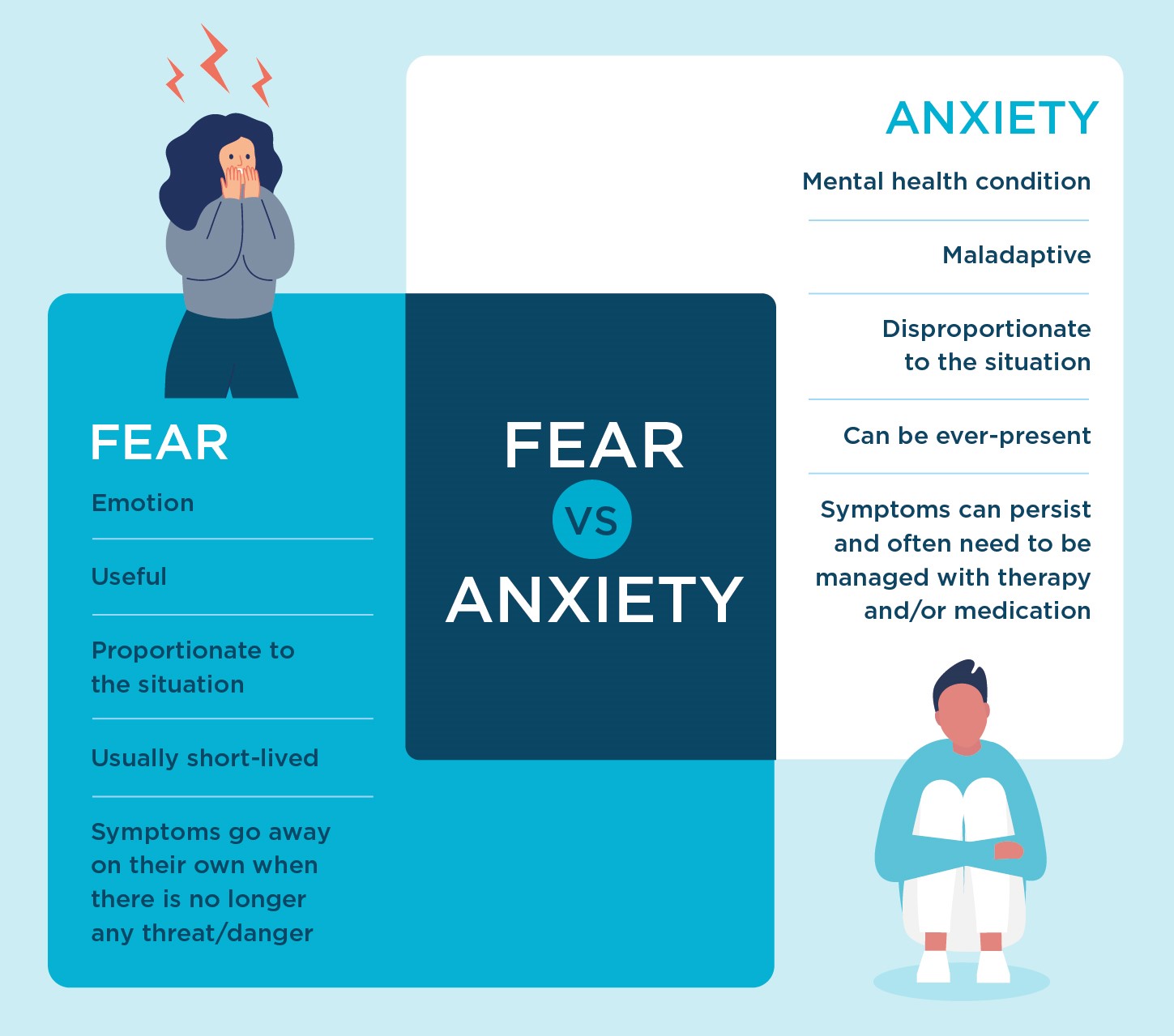Fear vs. anxiety: how to tell the difference
Here, we explore the similarities and differences between anxiety and fear, and provide tips on how to manage your symptoms.
Here, we explore the similarities and differences between anxiety and fear, and provide tips on how to manage your symptoms.


While there’s lots of overlap between how fear and anxiety can make us feel, there's a fundamental difference between the two. Fear is a useful response to a perceived threat – it helps us to survive and thrive. Anxiety, on the other hand, is what we experience when our fear response becomes out of control – it means we perceive danger all the time, even when it’s not there.
Here, we will explore the ways in which fear and anxiety are related to each other, the key differences between the two and the things you can do to overcome your fear and anxiety.
Fear can cause us to experience many of the same symptoms of anxiety. You might feel:
While some of the psychological and physical symptoms of fear and anxiety are the same, the core difference is that when we feel fear, it’s in response to real danger. With anxiety, these feelings happen in response to imagined danger.
Fear is a useful, evolutionary response that we, as humans, have developed in order to survive. Thousands of years ago, when we were living in hunter-gatherer groups, it was necessary for us to react appropriately to threats and be able to accurately assess whether we were safe. This is how we developed our ‘fight or flight’ response.
When we perceive something dangerous, our central nervous system becomes activated, triggering processes in the body that will either help us to fight or run. While it’s unpleasant, fear is a healthy emotion. Our fight or flight response has helped the human race to survive and thrive for millennia.
Anxiety is what we experience when our fear response becomes maladaptive (it becomes out of control and no longer serves its purpose). If you find that you’re constantly fearful and on edge, to the extent that this is interfering with your daily life, your fear response is no longer useful. This is when fear (an emotion) has developed into an anxiety disorder (a mental health condition).
Anxiety can make you nervous all the time, even when there's no immediate danger or threat. The same stress response experienced by our ancestors is triggered, except the threat is imagined or blown out of proportion.

When you’re struggling with anxiety, the fear that you’re experiencing can feel very real. However, there are a number of things you can do to deal with anxiety and fear, helping you to manage your response in situations that you perceive as being threatening.
The kinds of triggers that would have affected early humans are unlikely to be present in our day-to-day lives. However, this doesn’t mean that your fear feels any less real. For example, the ‘threat’ of public speaking may cause the same stress response for you as a sabre-toothed tiger may have caused our ancestors.
Thoughts can evoke the same trigger response as actual experiences and the nervous system can't tell the difference. Memories about actual events that occurred and fears about future worries can also be triggers.
Being able to identify what makes you feel anxious is a useful first step. Try to notice the situations that make you feel panicky, on-edge and fearful. By being able to recognise your own ‘sabre-toothed tigers’, you’ll be in a better place to understand where your fears are stemming from and take steps to address them.
Anxiety can cause our minds to play tricks on us. When you’re in a situation that makes you feel anxious, try to take a step back from the situation and really evaluate the actual threat posed by it.
Are you in immediate danger? Do you need to fight or run away in order to survive?
Asking yourself these questions might help you to put the situation into context and stop your anxiety spiralling out of control.
Anxiety and fear can have a huge impact on us, physically. That’s why it’s so important to look after yourself to make sure your basic needs are met. This includes:
It’s also important to try to stay socially active. Humans are social beings and staying in regular contact with friends and family is important when it comes to reducing anxiety and improving mental wellbeing.
There are a number of relaxation techniques for anxiety that can help. This is because they work to deactivate your stress response, helping you to calm down.
When our natural fear response becomes maladaptive, it can mean that we struggle to cope in day-to-day life. However, the good news is that anxiety is treatable and it’s possible for you to get back on track.
At Priory, our anxiety treatment experts can help you understand your triggers (your sabre-toothed tigers) and learn coping strategies to manage them more effectively moving forward. To find out how we can help you to overcome your fear and anxiety, get in touch today.
